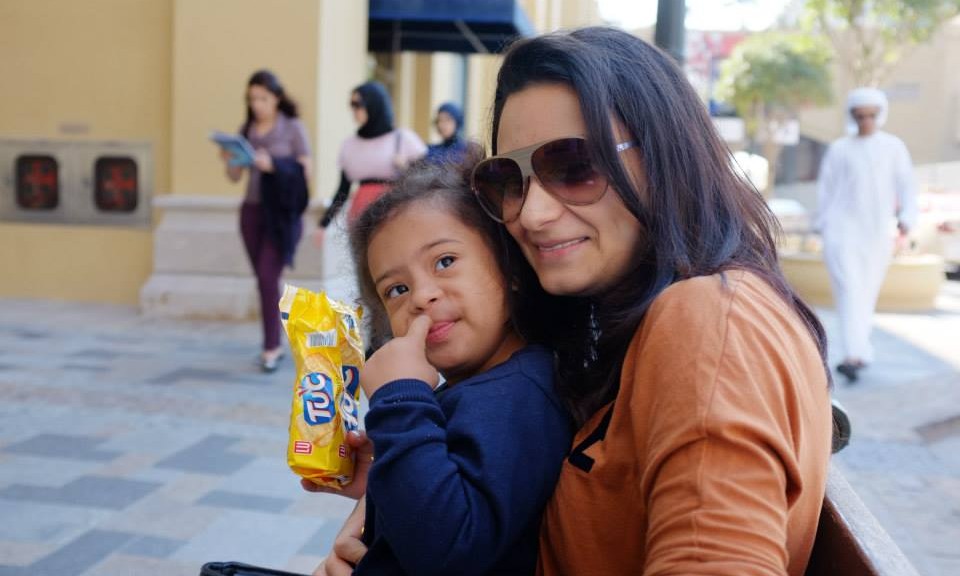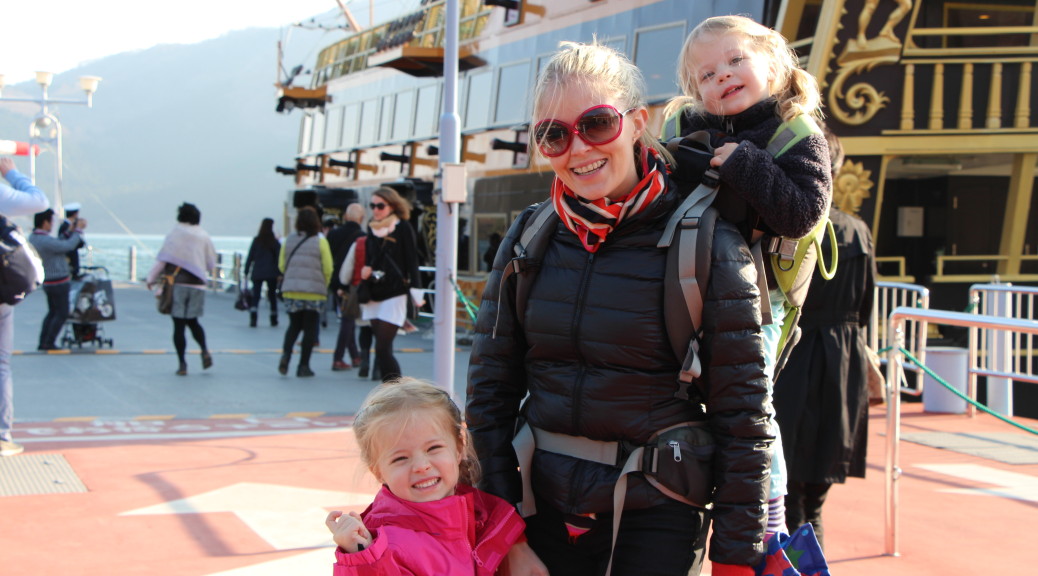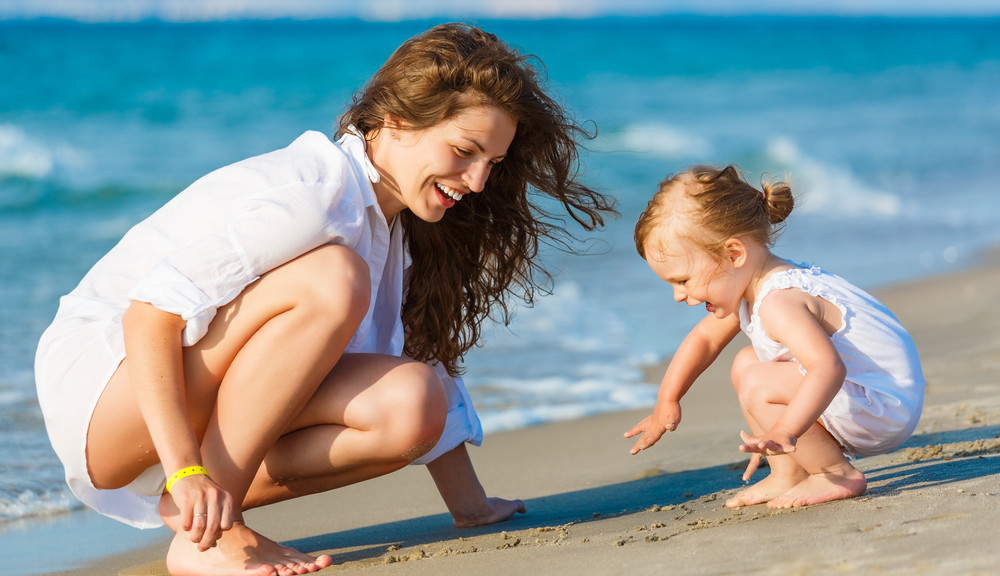I met an incredible, beautiful and relentless mum. Her name is Venera Muradyan, born and raised in Uzbekistan. After High School, she moved to Dubai and started her career with the Jumeirah Group and forged out a career for herself. She now works at The Change Initiative as the distribution head for some amazing eco-friendly products like Ecover and Naty Nappies. At the same time she is raising her daughter single-handedly who has a condition known as Down’s Syndrome. Venera tells us more about the beautiful and special relationship she has with her daughter – the joy, love and struggles.
You have a little girl that has a condition known as Down’s syndrome. Can you describe what down syndrome is and what advice would you give parents who are facing this for the first time?
Yes, I have sweetest, kindest, most charming girl named Fatuna. She is very bright, loves music, dance, painting. She is very affectionate and loves doing things together, watch movie or just lay down. She loves to be praised whenever she has done something well and loves attention. Frankly speaking she is just like every other child on earth. At home we don’t have any inconvenience on day to day basis: she does things on her own, she is very particular on her tidiness. I should thank my mother for this, because she had taken care of her for some time and had developed the best parts of her character.
For some time my mother didn’t want to believe that Fatuna has down syndrome, but I was always open about it. Yes she is special, and we have to do our best in developing and helping her.
Down syndrome is a chromosomal disorder caused by an error in cell division that results in an extra 21st chromosome. Every cell in the body contains genes that are grouped along chromosomes in the cell’s nucleus or center. There are normally 46 chromosomes in each cell, 23 inherited from your mother and 23 from your father. When some or all of a person’s cells have an extra full or partial copy of chromosome 21, the result is Down syndrome.
The only factor known to affect the probability of having a baby with Down syndrome is maternal age. That is, less than one in 1,000 pregnancies for mothers less than 30 years of age results in a baby with Down syndrome. For mothers who are 44 years of age, about 1 in 35 pregnancies results in a baby with Down syndrome.
I was 22 when I delivered her and knew nothing about this condition. I used to ask God why it happen to my daughter, and it took some time for me to understand that it happened because my child needed me.
How old is your little girl and when did you find out about her condition?
Fatuna is 5 years and 5 month now. We discovered that she has down syndrome at the time of delivery. I gave a birth in Belhoul Specialty Hospital. Doctors haven’t told me anything, but spoke to my family.
I had been in the hospital for 3 days before I found out. My mother looked at me and started crying, I asked her if she cries because she is happy, and she had asked me “Don’t you notice anything in Fatuna?”, I said no, but my heart started beating that time. She told me everything, and I couldn’t stop crying.
I looked at Fatuna lying down in that small baby cot, eyes closed, sleeping like an angel. It was a big mess in my mind, lots of thoughts at the same time, and zero understanding what will happen next, but just a little memory of kids with Down Syndrome I have seen in my childhood who didn’t have opportunities to develop and made me cry more.
We did the tests that were sent to Germany; it took 40 days to get the results. In those days we were googling, trying to get to know more, and unfortunately at the hospital where I have delivered they didn’t support me I must say.
Kids with Down syndrome have strong features by which you can recognize them, but we didn’t know them, and continuously pushed ourselves believing she doesn’t have it. I always say “Google knows everything, ask Google” and we searched for images of kids with down syndrome. At that point of time I understand my little one is a sunny child.
You are raising your little girl on your own after your husband left, which is hard, can you tell us how you balance your time between with your daughter and work?
Frankly…its hard, but the moments we spend together worth of everything.
Fortunately or not, I am a workaholic, and sometimes I don’t know the limits to stop myself thinking of work, but I try to be more organized.
Every evening we spend together, and weekends are usually planned well. I have very good nanny, and I am happy she is with us as when I am at work I relaxed knowing she is in good hands.
Is there a special school in Dubai that you send your little girl? How has this school benefited her?
Fatuna is a student of DCSN, which is a very nice school. That was the first school which I visited when she was yet 1 year old. We have recently started and seen lots of changes in her, she started developing faster, and the main stream for us is her speech.
There are few schools available in Dubai, and I hear a lot of good things about Sheikh Rashid Special Needs School. I follow their Facebook page, and see they do a lot in terms of activities, but space availability is an issue I think in Dubai overall.
Is there more that can help stimulate children that have down syndrome? What have you discovered that helps your daughter that you can advise other parents?
My daughter stayed in Uzbekistan for some period of time, and she was not exposed to social life much. It is very important for these kids to have full social life, as they learn through imitating others. Of course it is important to start motor skills training and speech therapy at earlier stage as most of them face speech difficulties.
For example, we still face an issue for which we didn’t get an answer and I don’t think we will, its all about talking to her. Kids with down syndrome don’t know how life is hard and there are people out there who might hurt them. My daughter doesn’t have a fear and she can go away from us when we are in public place.
What special care does your daughter need or is she quite independent?
Fatuna is developing well. She turns to be one of the best students in her class, and I am very proud. She is completely independent and does things on her own.
What values do you hope to instill in your daughter as she grows?
I wish she grows up to be a good person, kind and caring.
Every mother reaches moments of exhaustion. When you feel like that how do you keep going?
If I am very exhausted I usually need to be alone, which doesn’t happen so I meet my friends. They always support me and I am glad I have them around. Or we just stay home with my girl and spend all day together doing nothing but just resting.
What are your biggest fears for your daughter?
My biggest fear is her personal life. My biggest wish is for Fatuna to have her own family and be a mom. I believe she could be lovely mom.
At some point of time, I was down because I thought it would be impossible for her to find her pair, but I got inspired and motivated by watching YouTube video of a down syndrome couple, and understood it is possible and we are going towards it.
You work at the Change Initiative as the distribution head for some amazing brands such as Ecover, Ekobo, Naty and Ulster Weavers. Can you tell us more about those brands and how they can make a difference to the environment?
All the brands we distribute are in line with our philosophy of feeling good by doing good. We help our customers live a more sustainable lifestyle by offering high standard eco-friendly products. Our environment is preserved as much as your health. Ecover, a range of cleaning solutions, is free of petrochemicals, is made of plant-based ingredients, and is fully biodegradable. Naty wipes and nappies are the best choice for mums. They are as natural as possible and as efficient as traditional products. These products are hypoallergenic, biodegradable, chlorine-free, and no plastic is used; only GM free corn film. Did you know that from birth to toilet training, a baby goes through an average of 8000 diaper changes? So much waste… It is time to act and we offer the best for your baby and the planet!
What do you enjoy doing to take time out from everything?
I enjoy interacting with like-minded people who have more insight on different perspectives of life. I am always eager to meet professionals and network both personally and professionally.



